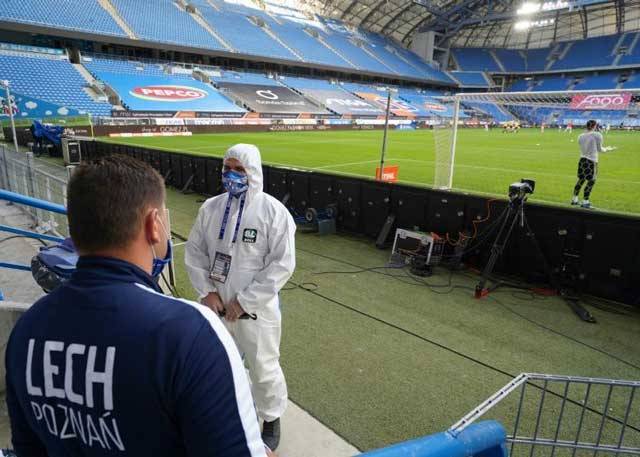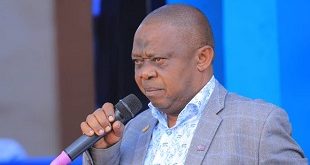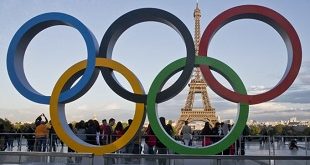
Paris, France | AFP | Daily medical questionnaires, frequent temperature checks, weekly testing, face masks in the changing room and showers at home only. Not to mention trying to work out how to celebrate goals.
Such is the reality for footballers in leagues returning from the coronavirus shutdown.
Poland was among the first European countries to start playing again as its league returned last weekend.
Games are behind closed doors for now, and adjusting to this new way of life is the challenge facing Tom Hateley.
The son of former AC Milan, Monaco, Rangers and England striker Mark Hateley, he plays for Piast Gliwice, the unheralded club who resumed their defence of the Polish Ekstraklasa title with a 4-0 mauling of Wisla Krakow.
After all that time without a game, they were 2-0 up inside 11 minutes, but — having witnessed social distancing at goal celebrations in the Bundesliga — Hateley had to check himself each time the ball went in.
“I didn’t have a clue what to do. We sort of all high-fived and that was that,” he laughs while speaking to AFP.
“I saw in Germany with Dortmund in their first game back, they were celebrating two metres apart. We weren’t like that, for us it was just a little fist bump and on we go.”
Hateley’s story is a reminder of the difficulties, even in a country like Poland which has suffered comparatively little in the pandemic, with just over 1,000 deaths for a population of 38 million.
“In Poland you had to wear masks out and about, which they have just stopped now this week. They have started to open shops, restrictions have been eased,” says the 30-year-old.
– All about the money –
“As for the Ekstraklasa, 50 people from each club had to go into isolation for two weeks before anybody was allowed to train.
“We had our temperature taken in the morning and at night and then we had to fill out a questionnaire every night for the doctor, which we are still doing now.”
Individual training began in early May and teams then went into three-week training camps to prepare for the resumption. Players undergo blood tests once a week to check for virus antibodies.
“We have to wear face masks at the club, any time we are in the stadium, in the changing rooms we have to have a mask on. The gyms are all closed. It is only when you go on the pitch that the masks come off,” says Hateley, shortly before departing for a night in a secure, specially-assigned hotel to prepare for his team’s next game.
It is a “strange situation”.
However, he understands why most leagues across Europe have been determined to restart, even in Poland where television revenue is nothing like that in major nations.
“Clubs all over the world need this money to survive, to be able to pay wages. It makes you realise that football is a business.
“Ideally, would everybody go back and play games, contact sport now? I’m not sure. I don’t think it would be rushed back if there wasn’t such big money at stake.”
Supporters will be allowed into matches in Poland from June 19, although stadiums will only be allowed to fill a quarter of their capacity.
For now, teams have to get used to playing in empty grounds, quite a contrast to early March, when over 23,000 saw Hateley’s team win at title rivals Legia Warsaw.
The midfielder is now in his second spell in Poland having previously featured for Slask Wroclaw in between playing in Scotland.
He helped Piast win their first Polish title last year. They now sit eight points off leaders Legia with 10 games left, but still hope to repeat the feat.
“I hope so. We’re again doing very well, for us. We are second, we are in a position to try to challenge again.”
 The Independent Uganda: You get the Truth we Pay the Price
The Independent Uganda: You get the Truth we Pay the Price


